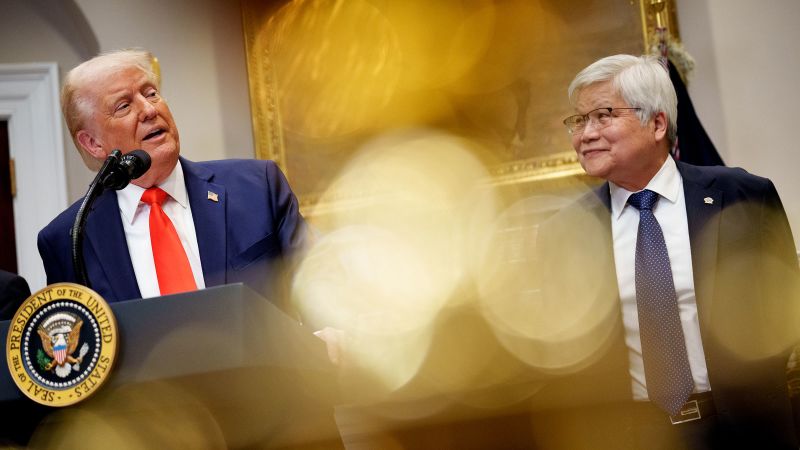The recent unveiling of a significant investment by Taiwan Semiconductor Manufacturing Company (TSMC) at the White House has sparked a wave of contrasting reactions, particularly in Taiwan itself. President Donald Trump presided over the announcement of TSMC’s commitment to invest $100 billion in the United States, labeling the semiconductor giant as “the world’s most powerful company.” However, this declaration has ignited alarm and unease amid political tensions, with many in Taiwan fearing the potential loss of their vital semiconductor sector to external pressures exerted by the United States.
This collective apprehension was articulated by former Taiwanese President Ma Ying-jeou from the opposition Kuomintang (KMT), who was quick to accuse the ruling Democratic Progressive Party (DPP) of surrendering TSMC to American interests as a form of “protection fee.” Ma characterized the investment as a considerable national security crisis, suggesting it could severely undermine public confidence, destabilize cross-strait relations, and negatively impact Taiwan’s geopolitical standing.
In an effort to mitigate public concerns, current President Lai Ching-te took action by appearing alongside TSMC’s CEO, CC Wei, to assure citizens that the company’s U.S. investment would not come at the expense of its operations and expansion in Taiwan. TSMC holds a remarkable position in the global semiconductor market, producing more than 90% of advanced microchips, which are fundamentally necessary for various technologies, including smartphones and artificial intelligence. Consequently, many Taiwanese believe that their semiconductor industry acts as a “silicon shield,” providing deterrence against any potential aggression from China, an assertion supported by China’s claim to Taiwan as part of its territory.
The political landscape in Taiwan has also been complicated by broader U.S.-China relations, as Beijing has ramped up military activities around Taiwan, raising domestic tensions. The strategic importance of U.S. military support for Taiwan is emphasized by the Taiwan Relations Act, which legally obligates the U.S. to assist Taiwan in self-defense against China. Nevertheless, the relationship has become increasingly convoluted, particularly with Trump’s rhetoric questioning Taiwan’s contributions to the semiconductor industry and suggesting that it should “pay up” for U.S. protection.
The sentiment in Taiwan has certainly been influenced by global events, with many residents drawing parallels between their situation and Ukraine’s ongoing conflict with Russia. Taiwanese citizens have expressed fears that their democracy could face a similar fate, given Trump’s volatile foreign policy stance that seems to shift dramatically. Amid this, the suspension of military aid to Ukraine has further fueled apprehensions about U.S. commitments in the Asia-Pacific region.
Residents like Tammy Chao have voiced alarm regarding Taiwan’s future security, perceiving Trump as someone who might leverage Taiwan as a negotiating chip, similar to his approach with Ukraine. In contrast, others in Taiwan, such as finance professional Fred Lin, have a more pragmatic view, acknowledging the necessity of engaging with the geopolitical realities of international politics.
Compounding concerns are TSMC’s investment decisions, which have been appealed for their strategic wisdom in navigating international pressures and maintaining relations with American clients. The CEO underscored that despite the investment in the U.S., groundbreaking semiconductor technology remains rooted in Taiwan, ensuring that local interests are not neglected.
New developments continue to unfold, with TSMC receiving numerous grants under the bipartisan Chips Act aimed at bolstering domestic semiconductor manufacturing. This backdrop sets the stage for TSMC’s aggressive plans in the U.S., including the establishment of multiple manufacturing facilities and a research center, capturing bolstered demand from major American tech players like Apple and Nvidia.
As this scenario evolves, analysts recognize that while TSMC’s actions appear to alleviate some immediate concerns for Trump, they also reflect an ongoing pressure for compliance in a landscape dictated by tariffs and geopolitical maneuvers. Amidst these dynamics, figures in the semiconductor industry stress the importance of making strategic concessions, albeit cautioning about the potential pitfalls of yielding to pressure that could lead to further demands.
Overall, the $100 billion investment from TSMC underscores a pivotal intersection between national security, international business, and changing power structures in the tech landscape. The implications of these decisions not only affect Taiwan’s semiconductor industry and its geopolitical stability but also resonate throughout the global economic framework, highlighting the complexity of maintaining competitive industries amid intense political pressures and foreign relations.



